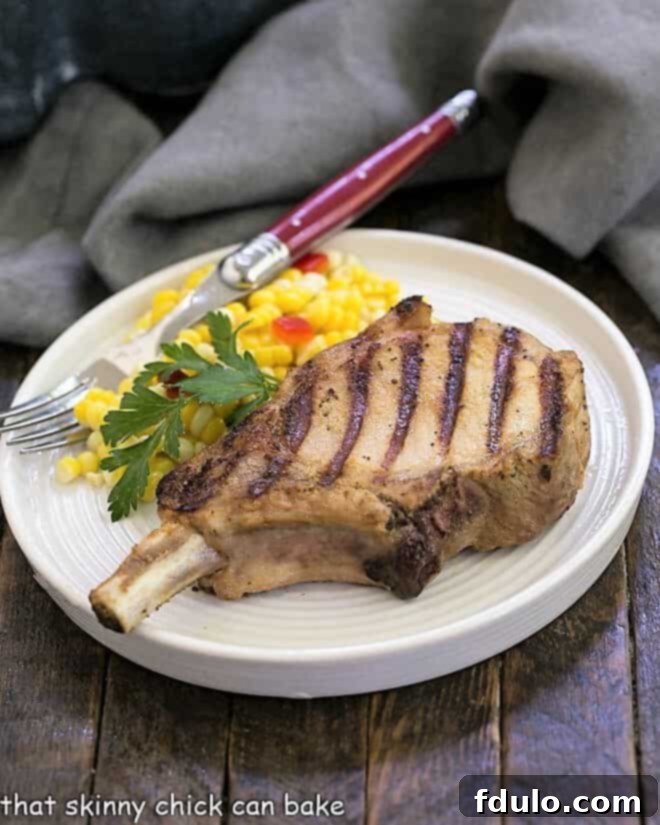Welcome to the ultimate guide for transforming your pork into a succulent, flavor-packed masterpiece! For years, home cooks have sought that elusive secret to perfectly grilled pork – tender, juicy, and bursting with taste. Today, we’re unveiling our signature **Best Pork Marinade**, a timeless recipe crafted with the vibrant zest of fresh lemon juice, the rich depth of soy sauce, and the subtle tang of Dijon mustard. This incredible blend quickly became our family’s go-to **Pork Tenderloin Recipe** for entertaining, and it performs equally marvelously on hearty pork chops. Prepare to elevate your grilling game and impress everyone at your next barbecue.
There’s something truly special about taking beautiful cuts of meat, like elegant frenched pork chops, and infusing them with a marinade that promises an extraordinary culinary experience. This **Pork Marinade Recipe** isn’t just about adding flavor; it’s about tenderizing, moisturizing, and creating a memorable meal that’s both easy to prepare and profoundly delicious. Whether you’re a seasoned grill master or a novice, this recipe guarantees a show-stopping main course that will have everyone asking for your secret.
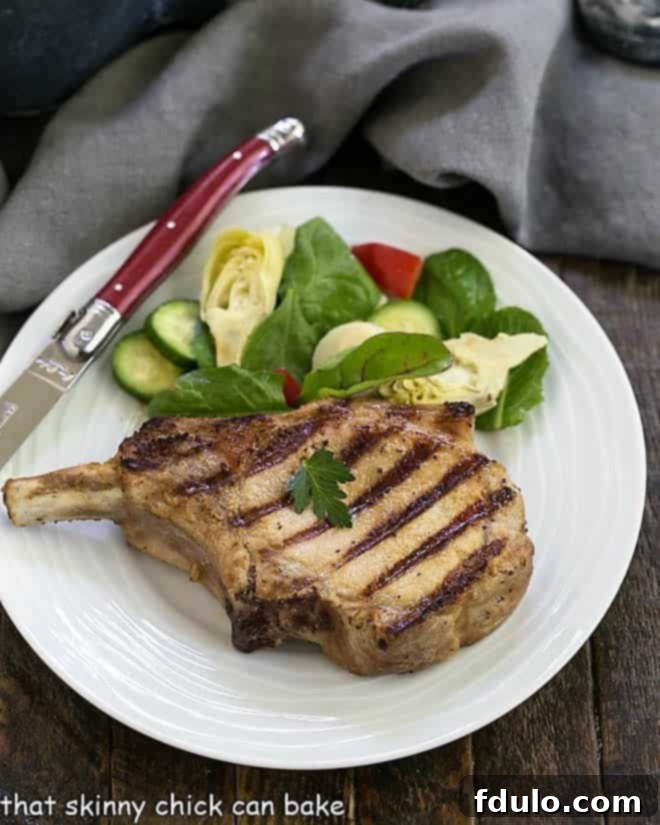
Why This Pork Marinade is a Must-Try for Your Next Meal
If you’re searching for a marinade that consistently delivers exceptional results, look no further. This recipe stands out for several compelling reasons:
- Unforgettable Flavor Combination: The synergy between lemon, soy sauce, and Dijon mustard creates a harmonious balance of zesty, savory, and tangy notes. This isn’t just a marinade; it’s a flavor enhancer that works like magic, transforming plain pork into something truly gourmet. The carefully chosen ingredients ensure a deep, complex flavor profile that penetrates every fiber of the meat.
- Guaranteed Juiciness and Tenderness: Many home cooks struggle with dry or tough pork. This marinade is specifically designed to combat those issues. The acidic components, like lemon juice and wine, gently break down muscle fibers, while the oil helps retain moisture. The result is consistently moist, tender pork that practically melts in your mouth, whether you’re grilling chops or tenderloin.
- Perfect for Entertaining (or Weeknights!): One of the greatest advantages of this marinade is its flexibility. For optimal flavor absorption, we recommend marinating your pork overnight. This makes it an ideal choice for company, as the prep work is largely done the night before, leaving you more time to enjoy your guests. However, even a shorter marinating time of a few hours in the morning can yield wonderfully flavorful results for an evening meal.
- Elevate Simple Pork to Extraordinary: If your usual routine involves a simple salt and pepper rub, prepare to be amazed. This marinade elevates the humble pork chop or tenderloin to a new level, infusing it with layers of flavor that are impossible to achieve with dry seasonings alone. It’s a culinary game-changer that will make you rethink how you prepare pork.
- Versatility Across Cuts: While initially developed for pork tenderloin, this marinade is incredibly versatile. It works wonders on various cuts, including thick-cut pork chops, boneless pork loins, and even pork roasts. The principles remain the same: deep flavor, tender texture, and a truly satisfying meal.
- PRO- Tip: For the most profound flavor, make sure to marinate your pork overnight. This extended period allows the rich medley of ingredients to fully penetrate the meat, creating an unparalleled depth of taste. Planning ahead means less stress on cooking day and maximum enjoyment!
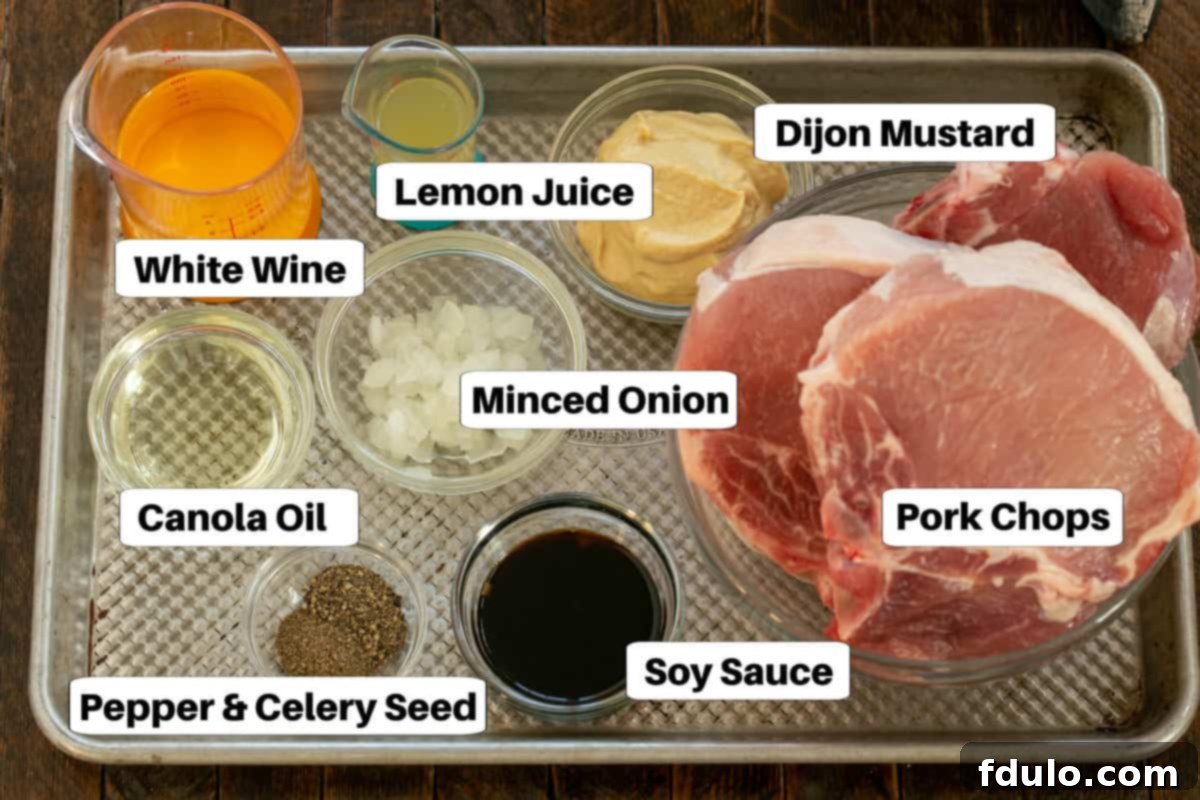
Key Ingredients for a Stellar Pork Marinade
Every ingredient in this recipe plays a crucial role in creating the ultimate flavor and texture. Let’s delve into what each component brings to our extraordinary pork marinade:
- Vegetable Oil: Beyond just adding moisture, vegetable oil acts as a binder for the other ingredients, helping them adhere to the pork. It also provides a protective coating that lessens the chance of the pork sticking to the grill grates and helps achieve a beautiful, even sear. You can also use canola oil or a light olive oil.
- Dry White Wine: This is a secret weapon for tenderizing and enhancing flavor. Wine’s acidity helps break down tough muscle fibers, leading to a more tender finished product. More importantly, it acts as a flavor enhancer, much like salt, boosting the overall taste profile of the dish. Don’t worry about the alcohol content; nearly all of it will cook off during grilling, leaving behind only its wonderful flavor. If you don’t keep an open bottle of wine, dry vermouth is an excellent, long-lasting substitute to keep on hand in the fridge. For a non-alcoholic alternative, consider chicken broth or apple cider vinegar (use half the amount of vinegar).
- Dijon Mustard: Dijon brings a distinctive tangy, slightly pungent flavor that is quintessential to this marinade. Its creamy texture also helps to emulsify the marinade, ensuring all the flavors are well distributed and cling to the pork. Don’t substitute with yellow mustard; Dijon’s unique character is key here.
- Soy Sauce: A cornerstone of savory marinades, soy sauce contributes both saltiness and a rich umami depth. Umami, often described as the fifth basic taste, adds a complex, savory satisfaction that makes the pork incredibly palatable and moreish. Opt for low-sodium soy sauce if you’re mindful of salt intake, or adjust other salty ingredients accordingly.
- Fresh Lemon Juice: The bright, citrusy notes of fresh lemon juice are vital for balancing the richness of the pork and the savory elements of the marinade. Its acidity also plays a significant role in tenderizing the meat. Always use fresh lemon juice; bottled varieties often lack the vibrant flavor and can sometimes have a bitter aftertaste.
- Minced Onion: Onions add a foundational aromatic flavor that permeates the pork. Beyond taste, onions contain natural enzymes that contribute to the tenderizing process, breaking down proteins in the meat for a softer texture.
- Celery Seed: This often-overlooked spice adds a wonderfully unique, slightly earthy, and herbaceous note that distinguishes this marinade. It provides a subtle layer of complexity without overpowering the other flavors. If you don’t have celery seed, a tiny pinch of dried celery flakes or even a bit of celery salt (reduce other salt) can be a distant substitute, but the seed is highly recommended.
- Black Pepper: Freshly ground black pepper provides a gentle heat and an earthy pungency that complements the other ingredients beautifully. Grind it fresh for the best aroma and flavor.
- Pork Chops or Tenderloins: The stars of our dish! This marinade works perfectly with both.
- Pork Chops: Bone-in chops tend to stay juicier, while boneless chops cook faster. Aim for chops at least 1-inch thick for best results on the grill.
- Pork Tenderloins: These lean, cylindrical cuts are incredibly tender. If your tenderloins have a silvery, tough membrane called “silverskin,” it’s crucial to remove it before marinating, as it won’t break down during cooking and will prevent the marinade from fully infusing the meat. Your butcher can often do this for you.
Step-by-Step Guide to Crafting the Perfect Marinated Pork
Making this incredible pork marinade is surprisingly simple, ensuring that even beginner cooks can achieve gourmet results. Follow these steps for perfectly flavored and tender grilled pork:
- Prepare the Marinade: In a large, sturdy Ziploc bag (gallon-sized is ideal) or a spacious 9 x 13-inch non-reactive dish (such as Pyrex or ceramic), combine all the marinade ingredients: dry white wine, vegetable oil, Dijon mustard, soy sauce, fresh lemon juice, minced onion, celery seed, and black pepper. If using a Ziploc bag, seal it and gently agitate or massage the bag until the mustard is fully incorporated and all ingredients are well mixed. If using a dish, whisk vigorously.
- Add the Pork: Carefully place your pork chops or tenderloins into the prepared Ziploc bag or non-reactive dish. Ensure that all surfaces of the pork are thoroughly coated with the marinade. If using a bag, press out any excess air before sealing to maximize contact between the pork and the marinade. If using a dish, turn the pork several times to coat.
- Marinate for Optimal Flavor: Place the sealed bag or covered dish in the refrigerator. Allow the pork to marinate for a minimum of 6 hours, or ideally, up to overnight (12-24 hours) for the deepest flavor infusion. During the marinating process, especially if using a dish, turn the pork occasionally to ensure even absorption of the marinade. This extended time is key to developing that truly unforgettable taste.
- Grill to Perfection: Preheat your grill to a medium-high heat (around 375-400°F). Remove the pork from the marinade, allowing any excess to drip off (discard the used marinade). Grill the pork chops or tenderloin for approximately 4-7 minutes per side, depending on thickness, or until it reaches an internal temperature of 145 degrees Fahrenheit (63°C) when measured with an instant-read meat thermometer inserted into the thickest part of the meat, avoiding the bone. For a beautiful sear, avoid moving the pork too much during the initial grilling time on each side.
- Rest and Serve: Once the pork reaches 145°F, remove it from the grill and transfer it to a clean cutting board. Tent loosely with aluminum foil and let it rest for about 10 minutes. This crucial resting period allows the juices to redistribute throughout the meat, resulting in incredibly moist and tender slices. After resting, slice against the grain and serve immediately.

Expert Tips for Unforgettable Grilled Pork
Having used this incredible pork marinade recipe for countless meals and gatherings over the years, I’ve gathered a wealth of insights to help you achieve perfect results every time. Originally a staple for pork tenderloin for our dinner guests, it’s become our go-to for grilling all sorts of pork cuts multiple times a month, especially when the weather calls for outdoor cooking. Here are some pro tips to ensure your marinated pork is truly unforgettable:
- Embrace the Overnight Marinate: While shorter times work, pork truly shines with an overnight marinade. It has the robust structure to handle extended marinating without becoming mushy, allowing the flavors to deeply penetrate. Aim for 12-24 hours for the best outcome.
- Always Marinate in the Refrigerator: Food safety is paramount. Raw meat should always be kept at a safe temperature (below 40°F / 4°C) while marinating to prevent the growth of harmful bacteria. Never marinate at room temperature.
- Utilize Ziploc Bags for Efficiency: Gallon-sized Ziploc bags are your best friend for marinating. They allow you to easily turn and flip the pork, ensuring all surfaces are consistently exposed to the marinade. This also uses less marinade compared to a flat dish.
- Place Bag on a Sheet Pan: A simple precaution! Accidents happen, and a leaky Ziploc bag can create a mess in your fridge. Placing the bag on a rimmed sheet pan provides an easy-to-clean catch-all.
- Flip for Even Coverage: Regardless of whether you use a bag or a dish, make sure to flip the pork at least once (or several times if marinating for longer periods) to ensure all sides get equal exposure to the flavorful marinade.
- Remove Excess Air from Ziploc Bags: When sealing your Ziploc bag, squeeze out as much air as possible. This creates a vacuum-like effect, ensuring maximum contact between the pork and the marinade, leading to better flavor absorption.
- Don’t Be Afraid of the Internal Thermometer: The FDA recommends cooking pork chops and pork tenderloin to an internal temperature of 145°F (63°C). At this temperature, the pork will be slightly pink in the center, incredibly juicy, and perfectly safe to eat. Forget the old advice of cooking pork until it’s white and dry – those days are over!
- Rest Your Meat: This step is non-negotiable. After grilling, allow the pork to rest for 5-10 minutes, tented loosely with foil. This resting period gives the muscle fibers a chance to relax and reabsorb their juices, ensuring every slice is incredibly moist and tender. Skipping this step often leads to dry meat.
- Consider Pork Thickness: Thicker pork chops (1.5 inches or more) will benefit from a slightly lower grill temperature or finishing with indirect heat to cook through without burning the exterior. Thinner cuts cook very quickly, so keep a close eye on them.
- Discard Used Marinade: Never reuse marinade that has come into contact with raw meat, nor use it as a sauce unless it has been brought to a rolling boil for at least 5 minutes to kill any bacteria.
Frequently Asked Questions About Pork Marinades
Marinating can seem like a complex process, but it’s really quite straightforward. Here are answers to some common questions about marinades and how to get the most out of them for your pork:
To marinate means to soak food, typically meat, poultry, seafood, or vegetables, in a seasoned liquid known as a marinade. This process serves multiple purposes: primarily to infuse the food with flavor, and also to tenderize tougher cuts of meat through the action of acids and enzymes present in the marinade. Through the process of osmosis, the food absorbs the flavors of the liquid, while acidic ingredients help to break down connective tissues, resulting in a more succulent and enjoyable eating experience. The duration of marinating depends on the type and density of the food, with tender seafood requiring minimal time and denser cuts of beef taking much longer.
Most effective marinades are built upon a foundation of several key components, each contributing uniquely to the final product. These typically include:
1. An Acid: Ingredients like vinegar (balsamic, red wine, apple cider), citrus juices (lemon, lime, orange), or wine are crucial for tenderizing. The acid gently denatures proteins, softening the meat’s texture.
2. An Oil: Olive oil, vegetable oil, or canola oil helps to add moisture, prevent sticking to the cooking surface, and carry fat-soluble flavors. It also helps to create a crust during cooking.
3. Seasonings: This category encompasses a vast array of herbs (rosemary, thyme, oregano), spices (paprika, cumin, chili powder), aromatics (garlic, onion), and other flavorful liquids like soy sauce or Worcestershire sauce. These are the primary flavor drivers, imparting unique tastes to the food.
4. Salt: Essential for enhancing flavor and, in some cases, aiding in moisture retention and tenderization through a process similar to brining.
Some marinades might also include sweeteners (honey, brown sugar) for caramelization or enzymes (from fruits like pineapple or papaya) for powerful tenderizing, though care must be taken with enzymatic marinades to avoid “cooking” the meat too much.
Marinating for too long, especially with highly acidic marinades, can lead to undesirable results, such as the meat breaking down too much and becoming mushy or having a mealy texture. Here are general guidelines to help prevent over-marinating and achieve the best flavor and texture:
Seafood: 15-30 minutes. Delicate fish and shellfish tenderize very quickly.
Boneless, Skinless Chicken Breasts/Thighs: 30 minutes to 2 hours.
Bone-In Chicken Pieces: Up to 12 hours (overnight). The bone provides some protection.
Pork Chops/Tenderloins: 4 hours is good, but overnight (12-24 hours) is optimal for infusing maximum flavor into pork chops or tenderloins without compromising texture with this specific marinade. Pork can handle longer marinating times than chicken.
Lamb Chops/Roasts: 4-8 hours.
Beef Steaks/Roasts: 6 hours up to 24 hours. Tougher cuts benefit from longer marinating.
Always remember to marinate in the refrigerator to ensure food safety.
Absolutely! While specifically optimized for pork, the balanced flavors of lemon, soy, and Dijon make this a fantastic all-purpose marinade. It would be excellent on chicken breasts, thighs, or even a whole spatchcocked chicken. For beef, especially leaner cuts like flank steak or sirloin, it would add a wonderful zest and tenderizing effect. Just be mindful of the marinating times – chicken might do best with 2-4 hours, while beef could go up to 6-8 hours for optimal flavor and tenderness.
Yes, you can certainly substitute the dry white wine if you prefer not to use alcohol or don’t have any on hand. Excellent non-alcoholic substitutes include chicken broth or vegetable broth, which will still add savory depth. For a touch more acidity, you could use half the amount of apple cider vinegar mixed with an equal part of water or broth. The flavor profile will be slightly different, but still delicious.
Yes, the marinade can be mixed ahead of time and stored in an airtight container in the refrigerator for up to 3-4 days. This makes meal prep even easier! When you’re ready to marinate, simply add the pork to the pre-made liquid.
The most accurate way to determine doneness for pork is by using an instant-read meat thermometer. The USDA recommends cooking pork to an internal temperature of 145°F (63°C), followed by a 3-minute rest. At this temperature, the pork will be perfectly juicy and might have a slight pink tint in the center, which is completely normal and safe. Avoid relying solely on visual cues, as appearances can be deceiving, and overcooked pork tends to be dry and tough.
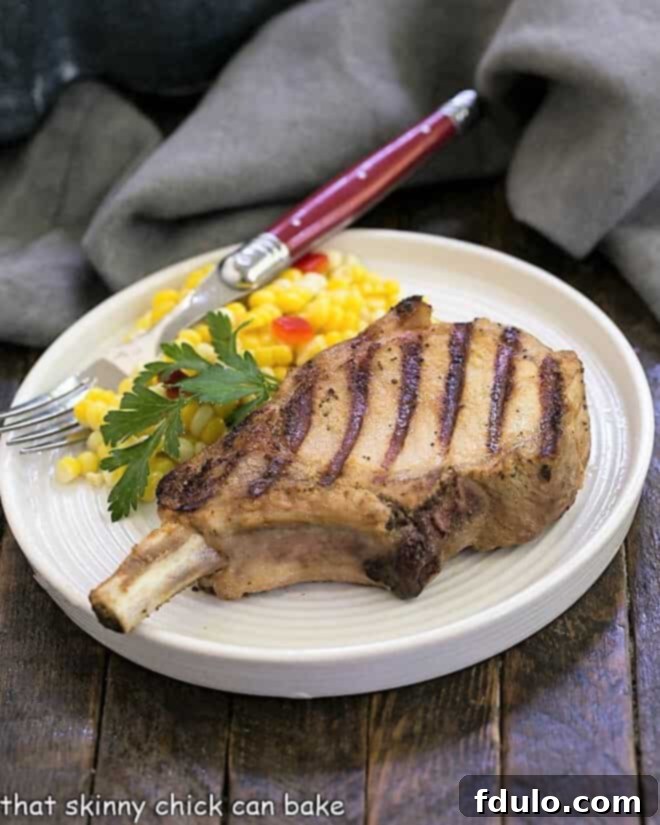
Complementary Serving Suggestions
A perfectly grilled pork chop or tenderloin deserves an equally delicious supporting cast. Round out your meal with some of my favorite side dishes and desserts that beautifully complement the flavors of this marinade:
- Tossed Salad with Homemade Ranch Dressing: A crisp, refreshing salad provides a wonderful counterpoint to the rich pork.
- Summer Panzanella: A vibrant bread salad with fresh tomatoes and burrata offers a delightful texture and Mediterranean flair.
- Honey Roasted Carrots: Sweet and savory roasted carrots bring a touch of earthy sweetness that pairs well with the marinade’s tang.
- Parmesan Roasted Asparagus: Simple, elegant, and quick to prepare, roasted asparagus with Parmesan is a classic side that never disappoints.
- Crispy Smashed Potatoes: These potatoes offer a fantastic texture contrast and a comforting base for your meal.
- Peach Blueberry Galette: A rustic fruit tart makes for a delightful and seasonal dessert.
- Lemon Pound Cake: Echoing the lemon in the marinade, a moist lemon pound cake offers a bright and satisfying end to your meal.
Explore More Delicious Pork Recipes:
If you love this marinade, you’ll surely enjoy exploring these other fantastic pork dishes and marinades:
- Slow Cooker Pulled Pork from Fifteen Spatulas
- Cuban Mojo Marinated Pork from Food Charlatan
- Whiskey Marinated Pork Tenderloin
- Pork Chops Dijonnaise
- Glazed Pork Tenderloin
- Slow-Cooked Pork Carnitas
- Another Easy Pork Marinade
- Pork Scaloppine
- More Entree Recipes
Stay in touch through social media @ Instagram, Facebook, and Pinterest. Don’t forget to tag me when you try one of my recipes! And if you love the results, please give it a 5-star rating in the recipe card.
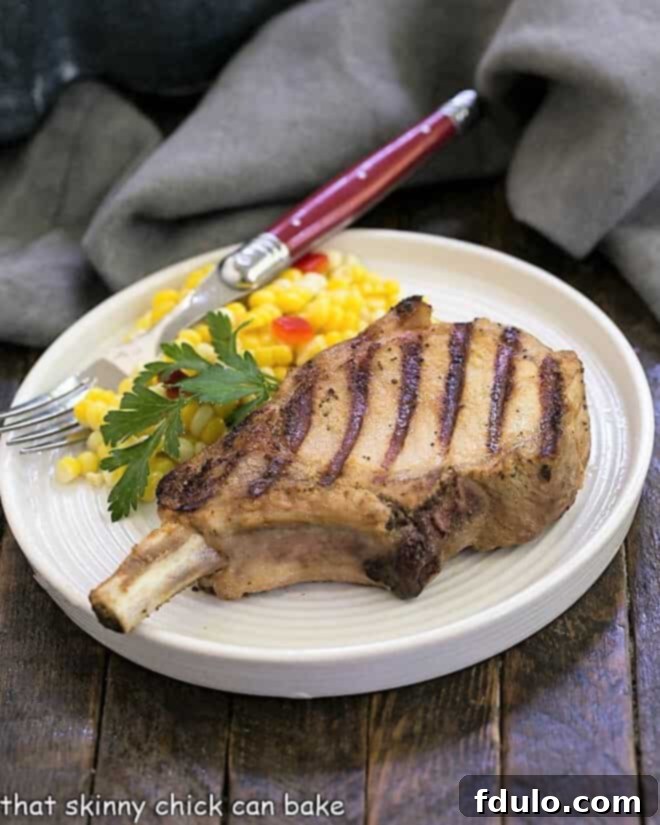
The Best Pork Marinade
5 minutes
15 minutes
20 minutes
6 servings
This exquisite marinade effortlessly transforms pork chops, pork tenderloin, or even a pork roast into a magnificent, flavorful entrée. It’s the ultimate secret weapon for juicy, tender, and perfectly seasoned grilled pork every time.
Ingredients
- ½ cup dry white wine
- 2 tablespoons vegetable oil
- 6 tablespoons Dijon mustard
- 2 tablespoons soy sauce
- 2 tablespoons fresh lemon juice
- 2 tablespoons minced onion
- ½ teaspoon celery seed
- ½ teaspoon black pepper
- 6 pork chops or 3 pork tenderloins (trimmed)
Instructions
- Combine all marinade ingredients (except the pork) into a gallon-sized Ziploc bag. Seal the bag and gently agitate until the Dijon mustard is fully incorporated and the mixture is uniform.
- Add your pork chops or tenderloins to the bag, ensuring they are fully coated. Remove any excess air from the bag before sealing tightly.
- Refrigerate the pork for at least 6 hours, or ideally overnight (12-24 hours), turning the bag occasionally to ensure even marination.
- Preheat your grill to medium-high heat. Grill the marinated pork chops or pork tenderloin until an internal temperature of 145 degrees Fahrenheit (63°C) is reached.
- Transfer the grilled pork to a cutting board, cover loosely with foil, and allow it to rest for 10 minutes before slicing and serving. This resting period is crucial for juicy results.
Notes
Adapted from the classic Creme de Colorado cookbook, this marinade has stood the test of time, proving its excellence in flavor and tenderizing capabilities.
Recommended Products
As an Amazon Associate and member of other affiliate programs, I earn from qualifying purchases.
- OXO Cutting Board
- OXO Measuring Beakers
- Measuring Spoons
Nutrition Information:
Yield:
6
Serving Size:
1 chop
Amount Per Serving:
Calories: 463Total Fat: 24gSaturated Fat: 6gTrans Fat: 0gUnsaturated Fat: 14gCholesterol: 163mgSodium: 809mgCarbohydrates: 3gFiber: 1gSugar: 1gProtein: 52g
Thatskinnychickcanbake.com occasionally offers nutritional information for recipes contained on this site. This information is provided as a courtesy and is an estimate only. This information comes from online calculators. Although thatskinnychickcanbake.com attempts to provide accurate nutritional information, these figures are only estimates.
Varying factors such as product types or brands purchased can change the nutritional information in any given recipe. Also, many recipes on thatskinnychickcanbake.com recommend toppings, which may or may not be listed as optional and nutritional information for these added toppings is not listed. Other factors may change the nutritional information such as when the salt amount is listed “to taste,” it is not calculated into the recipe as the amount will vary. Also, different online calculators can provide different results.
To obtain the most accurate representation of the nutritional information in any given recipe, you should calculate the nutritional information with the actual ingredients used in your recipe. You are solely responsible for ensuring that any nutritional information obtained is accurate.
HOW MUCH DID YOU LOVE THIS RECIPE?
Please leave a comment on the blog or share a photo on Pinterest
